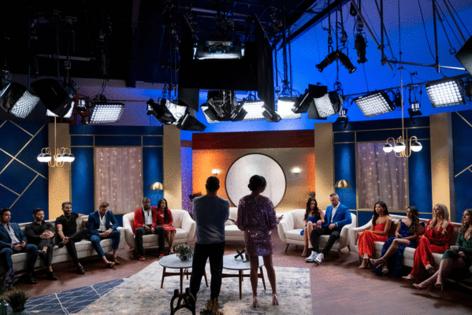Heidi Stevens: A nation hooked on 'Love Is Blind,' but divided on 'Don't Say Gay.' Make it make sense
Published in Lifestyles
I finally started watching “Love Is Blind,” the Netflix reality (I guess?) series where men and women go on a bunch of dates and get engaged without ever seeing each other.
All of their interactions, including the marriage proposal, happen in separate, windowless pods. If they agree to marry each other, they get to meet and hug and kiss and move in together. Then they walk down the aisle. Or breakup. Or walk down the aisle and break up at the altar.
It’s on its sixth season and consistently one of the most-watched shows on Netflix. And I can see why. I sat down to watch it with my daughter and her best friend one night (highly recommend watching with 18-year-olds if you have some around) and was instantly hooked. Now I’m in group texts deconstructing the generational wounds of infidelity and reading People magazine updates on past seasons and catching up on TikToks spoofing the whole premise.
It’s a lot. I regret nothing.
It is wild, though, to watch this carnival of heterosexuality play out at the same time that the “Don’t Say Gay” bill is under renewed scrutiny in Florida. A recent court settlement clarified what is and isn’t allowed in Florida classrooms, two years after the state passed a law prohibiting instruction on sexual orientation and gender identity in schools.
Under the terms of the settlement, students and teachers can discuss sexual orientation and gender identity inside their classrooms—as long as it’s not part of instruction. The Florida Board of Education will start sending memos to every school district letting them know they’re not prohibited from discussing LGBTQ people and gender identity, nor are they barred from having gay-straight alliance groups or hosting book fairs or plays with LGBTQ references or characters.
The settlement is welcome news to educators who feared losing their jobs if they displayed a family photo that included a same-sex couple. Or answered a child’s question about same-sex relationships. Or affirmed a student who drew a picture of their same-sex parents. Or hung a rainbow flag.
“What this settlement does is it re-establishes the fundamental principle, that I hope all Americans agree with, which is every kid in this country is entitled to an education at a public school where they feel safe, their dignity is respected and where their families and parents are welcomed,” Roberta Kaplan, the lead attorney for the plaintiffs, said in an interview with the Associated Press. “This shouldn’t be a controversial thing.”
But it is a controversial thing.
Gov. Ron DeSantis is calling the settlement a “major win” because it leaves the law on the books. And it still restricts what can be discussed during classroom instruction. Several other states—including Alabama, Arkansas, Indiana, Iowa, Kentucky and North Carolina—have passed similar legislation modeled after Florida's.
...continued
©2024 Tribune News Service. Distributed by Tribune Content Agency, LLC.







Comments